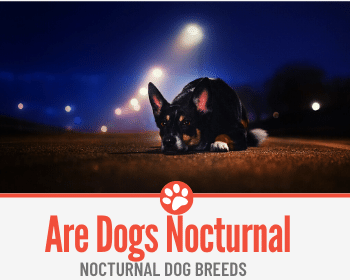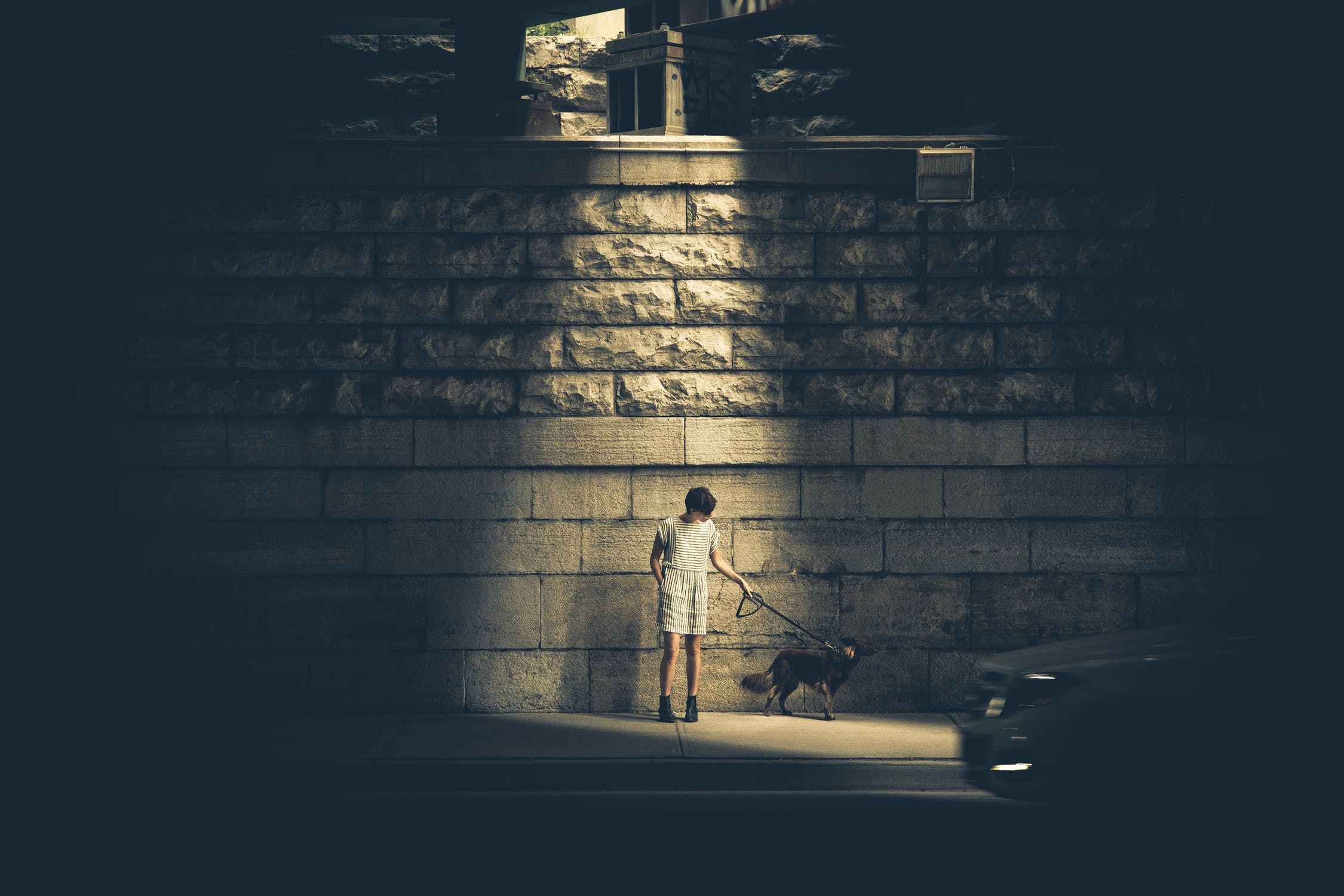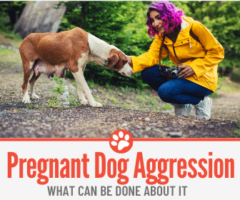 My neighbour has a dog that occasionally whines or barks very late in the night and even very early in the morning. Some people think that dogs do not sleep at night. And some dogs sleep so much during the day that you might begin to think that they are nocturnal.
My neighbour has a dog that occasionally whines or barks very late in the night and even very early in the morning. Some people think that dogs do not sleep at night. And some dogs sleep so much during the day that you might begin to think that they are nocturnal.
A lot of people have different opinions about it. So, it’s fair to want to know the truth before getting your pet.
Are Dogs Nocturnal?
Most dogs are not nocturnal. Instead of staying awake throughout the night, your dog prefers to sleep socially – that is, when you go to sleep. It will generally go to sleep when its owner goes to sleep.
If it does wake up, it may be because a sound which it perceives as a threat has woken it up. There are few breeds however which are nocturnal, see below if your dog is one of them!
What dog breeds are nocturnal?
Some dogs behave like nocturnal animals, especially feral dogs. Feral dogs are wild dogs and in general wild dogs have limited contact with humans. Because of this, they can be very active at night and during the early mornings and evenings.
Animals that behave like that are called crepuscular animals. They are usually more active in the early light of dawn or twilight.
Here is a short list of dog breeds that prefer to stay awake at night and while you sleep.
· The Anatolian Shepherd
Anatolian shepherds are a special Turkish breed that is native to the Anatolia region of Turkey. They are very strong and loyal livestock guardian dogs. Anatolian shepherds are bred to stay awake at night guarding livestock while the shepherds sleep.
· Tibetan Mastiff
Tibetan mastiffs are huge guard dogs that were bred specially for guarding sheep against huge predators like wolves, leopards, bears and tigers!
These big furry dogs retain their natural protective instinct for their human friends and can stay awake all through the night just to make sure.
· Great Pyrenees
The North American Great Pyrenees also known as Pyrenean Mountain Dogs are perhaps the best-known nocturnal dog breeds. They are naturally nocturnal.
Pyrs are huge dogs that have their origin around the Pyrenees Mountains that border Spain and France. Like the Tibetan mastiff and the Anatolian shepherd, Great Pyrenees were originally bred to guard sheep against predators like wolves. They still retain that protective instinct and can be aggressive towards any person or animal they perceive as a threat to their “flock.”
· Komondors
Komondors are nocturnal livestock breeds that are usually bred to take care of actual livestock. They can be very aggressive and intolerant. And like all livestock breeds, Komondors like to stay up all night, to make sure that no intruder threatens the safety of his flock.
You may have noticed that dogs that were historically bred to guard sheep, people or property tend to have nocturnal characteristics. Centuries of breeding the dogs to act as guardians at night have reinforced their feral instinct to hunt for prey or avoid predators during the night. One thing it illustrates is that our domesticated canine friends can easily adapt to their environment.
With proper training, however, dog breeds that tend to be nocturnal will adapt to their owner’s sleeping habits.
Like some of their close (although now domesticated) cousins, wolves are mostly nocturnal animals although that behaviour is heavily modified by the tidal forces of the moon and how much light is available at night. Wolves, like dogs, cannot see much better than you and me, which is why they are usually very active when the full moon is out, and the night is brighter.
Can a dog see in total darkness?
Dogs can have an unusual ability to hear. Dogs can hear sounds that are up to 4 times further from the distance the average human can! That’s simply astounding. You might also wonder if dogs can see as well as they can hear.
Can a dog see in the dark? Yes, dogs can see in the dark. Dogs can see better in the dark than most humans because they have a larger pupil to let in more light and more light-sensitive cells on their retina.
However, dogs do not rely primarily on their eyes for detection. They have a well-developed sense of smell and – as I mentioned earlier, very good ears. Cats do have much better vision in the dark than dogs.
Total darkness means the complete or near absence of any light. While dogs can see better than humans in dim light, dogs cannot see in total darkness. As good as your dog’s eyes are in the dark, they are pretty much near-sighted. A human can clearly see an object 63 feet (23 meters) away, while a dog will need the object to be as close as 20 feet (6 meters) so that it can see it.

How many hours a day do dogs sleep?
Dogs mostly snooze throughout much of the day. On average, a dog will sleep for about 12 – 14 hours. According to the National Sleep Foundation1, dogs spend about 50 per cent of their day sleeping, 30 per cent relaxing while awake and are only active 20 per cent of the time.
Not all dogs spend half the day asleep though. Police dogs or farm dogs – generally any working dog – spend much less time asleep than dogs who just stay at home. Regardless of how long the dogs sleep, they are mostly light sleepers. Any sharp sound or a sound they are not accustomed to can wake them up.
Bigger breeds tend to spend more time asleep. Curiously, though, some of those huge dogs who spend much of the day sleeping, like Great Pyrenees are also usually awake at night. The bigger the dog, the greater the tendency for it to spend much of its time snoozing. That is in fact, why they are sometimes called, “mat dogs.”
How much sleep do dogs need?
Dogs need at least 12 hours of sleep a day. Some may need more, some less.
Puppies, in particular, use up a lot of energy while playing and exercising during the day. They are usually worn out by nightfall. As a result, they should be allowed to sleep for up to 18 hours. They may even log 20 hours of sleep in a single day.
Older dogs will need to sleep more because they easily get tired.
When should you be concerned about how long your dog spends sleeping?
Are you worried about how long your dog is sleeping? If your pet is sleeping for 12 or even 14 hours a day, you do not need to worry. However, if you see any of the following signs, you should not hesitate to consult a qualified vet.
When should you be concerned about your dog’s sleeping pattern? You should be concerned about your dog’s sleep when:
- Your usually active dog is spending more time asleep or if a regular snoozer is unusually active.
- Your dog is lethargic and unusually unwilling to play.
- Excessive sleeping interferes with their eating or if they lose their appetite.
- Your dog suddenly falls asleep – especially when in the middle of an engaging activity. Medically, it is called narcolepsy and is a chronic sleeping disorder that can cause a sudden loss of muscle control. While it is not life-threatening, it is important to take note of the behaviour and work with your dog and vet to try to minimize narcoleptic episodes.
- Your dog wakes up afraid or looking stressed.
- Unusual behaviour like aggression or anxiety is associated with an increase in the time your dog spends asleep.
Most, of these signs, might not be serious especially if your dog is a senior. Other than that, it doesn’t hurt to get a vet to take a look at her, just so you’re sure.
Why is my dog restless at night?
If your dog is mostly asleep during the day, then you might find it hard to make it sleep at night. Also, nocturnal restlessness can be a sign that something is wrong. Check with your local vet, to be sure that everything is alright with your dog. Your dog could be restless at night for a variety of reasons.
For one, lack of exercise, can make your dog pace the room restlessly or even engage in some destructive behaviours at night. Dogs need their exercise and they will readily go to sleep when they have burned off excess energy. As the saying goes, “A tired dog is a happy dog” and tired dogs are sleepy dogs!
Secondly, dogs may become a bit restless at night as they age. One common reason why they become restless is that older dogs may experience joint or muscle pain. You can help your senior by buying him a comfy orthopaedic bed that will ease the pain. Also, check with your local veterinary doctor for sound medical advice on how to improve the life of your ageing dog.
If your dog is a young puppy, then chances are that you’re a first-time dog-parent because you’re worried about their “restlessness”. Young puppies can be very demanding. They have a lot of energy to expend and if they don’t use it up, they’re unlikely to fall asleep easily. Your dog is restless because it may not be getting enough exercise.
Sometimes restlessness in dogs is caused by separation anxiety. If your dog is too attached to you, he might not be too keen on sleeping away from where he can see you. If they kept apart, they may bark and whine all through the night.
Some dog breeds, especially those with short snouts are prone to suffer from sleep apnoea. Restlessness is a common symptom of sleep apnoea. Sleep apnoea is a sleeping disorder that affects breathing. It can be very dangerous and causes sleep deprivation
If your dog snores loudly or is tired even after a long sleep, it might just be suffering from apnoea. Dog breeds like Pugs, Pekingese and Bulldogs can easily develop sleep apnoea
How to make a dog go to sleep.
The first and (ultimately) the best way to get your dog to sleep at night is to train it early. Although dogs are social sleepers and can adapt to their environment, they are not just going to magically join you to sleep at night especially if your dog has not been trained properly or is from an environment where he was allowed to roam free.
Establish a routine for your dog early. Gently teach him that evening is a time for relaxing and then sleep. Follow these six tips to get your dog to sleep better at night.
- Make sure your dog gets plenty of exercise during the day.
- Dogs like routine, make sure to start training them early and establish an evening routine that gradually winds down.
- Firmly and gently resist cuddling or paying attention to your dog when he is supposed to settle down to sleep. They can be a bit fussy, but in time they will adjust and even like it.
- Do not play with or carry out any stimulating activity with your dog just before bedtime. He might just want to continue playing.
- When training your dog to go to sleep at night, make sure you maintain a positive voice. If you are using a dog crate, or even a bed, you don’t want your dog to associate getting to sleep as a punishment.
- Help your dog relax. Make the area where your dog sleeps as quiet and comfortable as possible. Also, consider playing soothing music or even placing a clock close to your pup. The gentle rhythm of the clock can help the dog relax and sleep faster.

What can I give my dog to make it sleep at night?
If you’ve tried helping your dog to relax and sleep, or your dog has anxiety issues that disrupt his sleep pattern, you might consider giving him supplements that can help him relax and sleep.
If your dog has persistent issues with sleep despite all your efforts and especially if the behaviour is recent, you should consult your veterinary doctor for advice and prescriptions that can help your dog sleep better. One commonly used supplement is melatonin. However, you should consult your vet, for proper diagnosis and advice on dosage before using it on your dog.
Do not give human anti-anxiety medication to your pup. They can cause serious health complications.
Giving your pup a delicious treat is another way of encouraging him to get to bed. If he associates night treats with going to bed or his crate, he may readily do so when it’s bedtime.
You could also try giving your dog its favourite chewy toy. Chewing on the toy eases anxiety and can help your dog get to sleep faster.
Do dogs know the time of the day?
Dogs can sense time, but of course, they do not measure time the way you and I do. One reason is that animals (including dogs) have circadian rhythms which help them perceive time in response to how light changes during the day and at night.
4 Amazing things you never knew about dogs!
Some experts think that dogs sense time by their extraordinarily strong sense of smell. Dogs, according to them can “smell time”. They can also do extraordinary things apart from telling the time with their noses. Here are just four extraordinary things dogs can also do that you probably didn’t know about.
- A dog’s urine can corrode metal.
- Dogs can be trained to smell cancer.
- Dogs like to poop in alignment with the earth’s magnetic field. They will try to make sure they poop in a North-South axis rather than an east-west axis.
- All dogs have a unique nose print.
_________________________________________________
Know more: References for this article.
- “Narcolepsy in dogs” – VCA Hospitals https://vcahospitals.com/know-your-pet/narcolepsy-in-dogs
- “Narcolepsy” – VetSream https://www.vetstream.com/treat/canis/diseases/narcolepsy
- “Dog facts: 11 Amazing thigs you never knew about man’s best friend” – Mirror https://www.mirror.co.uk/news/weird-news/10-dog-facts-amazing-things-3908754
- “How well do dogs see at night?” Science Daily/University of Wisconsin – Madison https://www.sciencedaily.com/releases/2007/11/071108140336.htm






